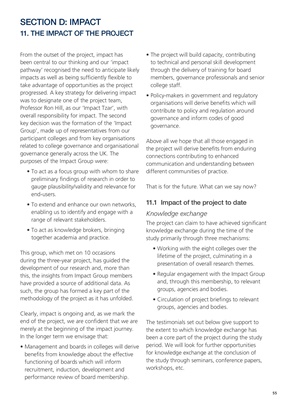
55
From the outset of the project, impact has
been central to our thinking and our 'impact
pathway' recognised the need to anticipate likely
impacts as well as being sufficiently flexible to
take advantage of opportunities as the project
progressed. A key strategy for delivering impact
was to designate one of the project team,
Professor Ron Hill, as our 'Impact Tzar', with
overall responsibility for impact. The second
key decision was the formation of the 'Impact
Group', made up of representatives from our
participant colleges and from key organisations
related to college governance and organisational
governance generally across the UK. The
purposes of the Impact Group were:
• To act as a focus group with whom to share
preliminary findings of research in order to
gauge plausibility/validity and relevance for
end-users.
• To extend and enhance our own networks,
enabling us to identify and engage with a
range of relevant stakeholders.
• To act as knowledge brokers, bringing
together academia and practice.
This group, which met on 10 occasions
during the three-year project, has guided the
development of our research and, more than
this, the insights from Impact Group members
have provided a source of additional data. As
such, the group has formed a key part of the
methodology of the project as it has unfolded.
Clearly, impact is ongoing and, as we mark the
end of the project, we are confident that we are
merely at the beginning of the impact journey.
In the longer term we envisage that:
• Management and boards in colleges will derive
benefits from knowledge about the effective
functioning of boards which will inform
recruitment, induction, development and
performance review of board membership.
• The project will build capacity, contributing
to technical and personal skill development
through the delivery of training for board
members, governance professionals and senior
college staff.
• Policy-makers in government and regulatory
organisations will derive benefits which will
contribute to policy and regulation around
governance and inform codes of good
governance.
Above all we hope that all those engaged in
the project will derive benefits from enduring
connections contributing to enhanced
communication and understanding between
different communities of practice.
That is for the future. What can we say now?
11.1��Impact�of�the�project�to�date
Knowledge exchange
The project can claim to have achieved significant
knowledge exchange during the time of the
study primarily through three mechanisms:
• Working with the eight colleges over the
lifetime of the project, culminating in a
presentation of overall research themes.
• Regular engagement with the Impact Group
and, through this membership, to relevant
groups, agencies and bodies.
• Circulation of project briefings to relevant
groups, agencies and bodies.
The testimonials set out below give support to
the extent to which knowledge exchange has
been a core part of the project during the study
period. We will look for further opportunities
for knowledge exchange at the conclusion of
the study through seminars, conference papers,
workshops, etc.
SECTION D: IMPACT
11. THE IMPACT OF THE PROJECT